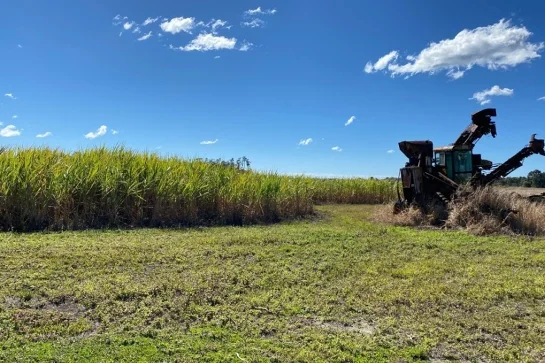
Ground-breaking research from Southern Cross University is set to finally answer the questions of a groundswell of farmers looking to build carbon in their soils through regenerative practices.
The University is the recipient of a $2.5 million Building Landcare Community and Capacity Program* grant that will deliver eight projects quantifying the benefits of regenerative agricultural practices in restoring degraded soils across Australia over three years.
All eight innovative projects are applied collaborative research that can be scaled for greatest impact.
Director of Southern Cross University’s Strategic Projects and founder of the Regenerative Agricultural Alliance (RAA) Lorraine Gordon said, “We have partnered our leading researchers with some of our most progressive farmers.
“The research is a ground-breaking model in that it is a bottom-up farmer-driven approach that answers the questions farmers want to know.”
The University will be doing applied collaborative research in bio-regions around the country with groups of farmers, consultants, natural resource managers and researchers to address a wide range of challenges to help farms become more resilient in a changing climate.
Currently, the focus is on soil research. Specifically, using regenerative practices to restore degraded soils and increase soil carbon. Examples include various applications of multispecies cover crops, effects of pesticides on soil microbial diversity, integrating biochar into regenerative agriculture practices and building soil carbon through regenerative practices.
“In order to have impact, these projects have been designed as pilots to build capacity in different bioregions across the country. Our multi-species cover cropping will be triangulated across three states of Australia,” said Ms Gordon.
A dire need to build carbon
The research is being driven by Southern Cross University’s Regenerative Agriculture Alliance, a collaboration of researchers, industry leaders and educators, which aims to see agriculture transition to regenerative agricultural practice Australia-wide.
“Transitioning to regenerative agriculture is crucial if we want to prevent further degradation and desertification of our landscapes,” said Ms Gordon.
“By supporting and enhancing the living matter in our soil, regenerative agricultural practice also draws down carbon from the atmosphere and into the soil, and can play a critical role in reducing greenhouse gas emissions and global warming.”
With the carbon farming market in Australia developing at pace, more farmers are crying out for an evidence-based approach to sequester more carbon and diversify farm income.
“This research fills a glaring gap in knowledge which has been a major obstacle to an Australia-wide transition to regenerative practice,” said Ms Gordon. “This research will finally give farmers across different bioregions an evidence-based approach to build carbon in their soils by implementing practices such as multispecies cover cropping.
“We don’t have time to waste. There is an urgent need for farmers to transition to regenerative practice which is why these projects have been designed to be scalable and transferable across the country.”.
Southern Cross University will use its expertise as research brokers to disseminate the project findings to farmers across the country. It will also run field days at each site during the three- year projects to engage more farmers with the research journey.
A need for applied research
The University’s soil research announcement follows a speech last month by the new Minster for Education and Youth, Hon Alan Tudge MP, in which he argued the need for greater collaboration between industry and higher education on innovation projects.
“Too often, Australian research falls into the ‘valley of death’ between academia and industry, between theory and real-world application,” Minister Tudge said.
“The focus in Australian Universities should be around research that builds sovereign capability, or greater economic diversity and productivity.”
Ms Gordon agreed that the days of producing research that collected dust was over.
“We are facing overlapping environmental, economic and social crises, worldwide. The Regenerative Agriculture Alliance at Southern Cross University is committed to improving the country’s resilience through research, education and advocacy,” said Ms Gordon.
“This soil research is a different model compared to traditional research. It’s a bottom-up approach, not a top-down one. Farmers have come to the researchers with a problem and farmers, researchers and other important stakeholders collaborate to co-create solutions delivering on-the-ground benefits for farmers, whilst also contributing to a scientific base of knowledge.
“We’re bringing farmers and researchers on a journey to solve the problem. There are no silos to be seen in this approach.
“Farmers, researchers, natural resource management groups like Local Land Services or Landcare, consultants, indigenous elders – in every project you’ve got a number of perspectives looking at the problem through their own lens.”
Driving soil research impact through collaboration
Since 2016, Southern Cross University’s Farming Together Program has fostered innovative collaborative models such as co-operatives to help farmer, fishing and forestry groups tackle supply chain issues, drought and climate change and deliver triple bottom line benefits, including improved farm gate returns.
Farming Together has evolved to become the engine that drives many of RAA’s collaborative regenerative projects.
“Collaboration is essential if we want to deliver impact at scale,” Ms Gordon said. “This may mean we need to do business differently. It might mean our business structures look different or it might simply mean working together in more collaborative ways.
“Hence, why Farming Together is starting now to explore different collaborative models such as the likes of carbon cooperatives or biodiversity mutuals.
“We want to co-deliver the best applied research for farmers so that they can benefit from building carbon in their soils but we need to do that in a way that actually puts the power back in the hands of the people that are managing our soils and working with their environment and their landscapes. Collaborative business models will be at the heart of this.”







